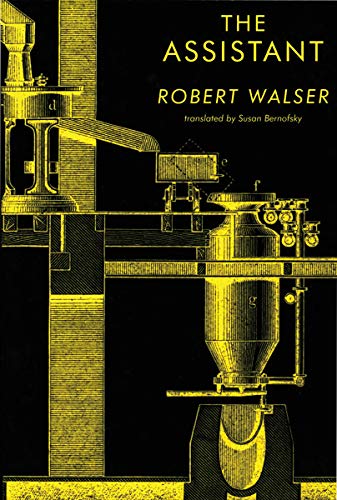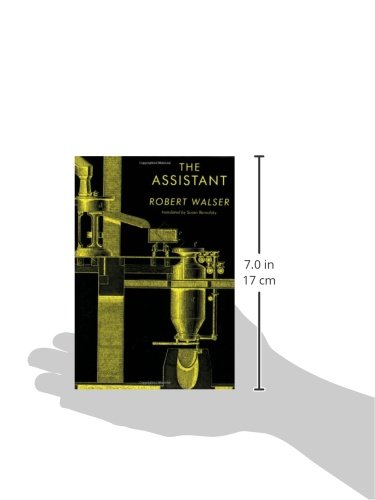Customer Services
Copyright © 2025 Desertcart Holdings Limited
Desert Online General Trading LLC
Dubai, United Arab Emirates



The Assistant (New Directions Paperbook)
D**H
"Curse those bacon-and-sausage eaters!"
Joseph Marti, a young man between jobs, gains the position of Assistant at the villa and workplace of Carl Tobler, a struggling and possibly-cockamamie inventor. Despite Tobler's unpromising professional struggle and his lack of investors, he puts no brakes on his expensive joie de vivre. Joseph ends up smoking cheroots, sending away creditors, taking hilarious dictations, alternately entertaining and vexing Tobler's wife, and enjoying the Tobler's bountiful lunches and dinners:"Sit down. Wherever you like, it doesn't matter. And eat until you've had your fill. Here's the bread. Cut yourself as much as you'd like. There's no need to hold back. Go ahead and pour yourself several cups--there's plenty of coffee. And here is butter. The butter, as you see, is here to be eaten. And here's some jam, should you happen to be a jam-lover. Would you like some fried potatoes as well?"Hospitality is practically stuffed in Joseph's face, though he refuses to believe that he ever earns it. A good stuffing of hospitality at the dinner table is a recurring theme in Walser's work.The Tobler family slides into dispossession. Walser captures the impendingness of the situation by describing the characters and their interactions over the course of about a year. A letter from Tobler's mother coldly punctuates the end of the story with a vicious moral, though that isn't the end of the book.What shines to me isn't the plot (does anyone read for plot?) but the details of Joseph's inner turmoil, its occasional outlets, plus the THEATRICAL MOOD SWINGS OF TOBLER, and Walser's unbelievably fresh and insightful descriptions of simple events like going for a swim in a lake or waking up in bed on a Sunday morning. His pre-kafkaesque description of a credit auditor's lurking around the villa is a classic passage here, too. (It rivals or surpasses the supernatural domestic fantasy of Marquez's Solitude and the bureacratic goons of Kafka, and pre-dates both of them).The sudden appearance of a military prison episode forms one of Walser's best and only ensemble scenes. ("Slap the Ham")Joseph is the usual Walserian hero: he's timid, he's doubtful of his own importance and abilities, he privately rags on himself out loud in high-style, yet he will burst out with an impudent speech to his masters. I still don't fully understand whether these impassioned officially-worded outbursts are a piece of comedy, a projection of Walser's mental state, or have some basis in the reality of actual conversations in Switzerland/Germany in the 1900's.If you're new to Walser I recommend Jakob Von Gunten, his most accessible and probably famous work, which is made so breezy by its young schoolboy narrator. Everyone should start there. If you're not new to Walser then you'll obviously want this book, there's nothing to say so I've done you no favors, unless you are a stick in the mud.Did I forget to say this is an extremely enjoyable book?
S**S
Would be even better shorter
Nyreview has been reissuing some deserving novels and this one has many good passages and virtues. Still you do have to plod through a lot of description of nature which while relevant to the protagonist's state of mind coulld be cut drastically, making room for ome other kinds of insight into a shallow picture of him. There are so many really wonderful neglected novels and unread classics that I would hesitate to ask someone to spend much time on a rather more mediocre example.
A**R
An Extraordinary Book
I haven't read anything like Walser's writing before and was engrossed completely from the first pages. This is one of those rare books in which honesty doesn't come at the expense of beauty, nor beauty at the expense of honesty. It was a great pleasure to be in the company of this novel's narrator, a "peculiar" character by his own description, but peculiar in the best sense of the word. He has made me see the world, ordinary life, nature, the complexities of the human mind and heart in an entirely new light. I can't recommend this book highly enough.
L**N
Ice-cold streams rising to touch you
In 1903 a young man takes a job as clerk and accountant to an inventor. The inventor's office and workshop is in the basement of his imposing villa, close to the shore of Lake Zurich. The inventor has a wife and four children. The Assistant (we will capitalize his job title) is given a room at the top of the house and he dines with the family. They live well. Four years later, the young man, who has by now followed his brother, an illustrator and theatrical designer, to Berlin, enters a literary competition with a novel which he later said was written in just six weeks. The novel is about a young man who takes a job as Assistant to an inventor. The first name of the inventor and those of all four of his children are the same as those of the real-life originals. The "fictional" villa and its location are exactly as in life; the lakeside village has just two letters of its name changed; and the Assistant in the novel is given the author's mother's maiden name.The above is not the plot of The Assistant; it's the real story behind a novel that clearly has significant autobiographical elements. Walser as a young man was able to obtain jobs (if not to hold them down), serve as required in the Swiss militia, and lead an unexceptionable life, but he felt himself a social misfit and spent the last 27 of his 73 years in mental institutions, more or less voluntarily. He died in 1956. Latter-day psychiatrists think he may have suffered from Asperger's syndrome. The heightened sensitivity of his writing and the introspective and sometimes unusually detached perspective that his characters have on themselves may be attributable to that condition. Walser wrote "I would wish it on no-one to be me." As readers, we can be grateful that through his writing he was able to redeem at least some small part of the pain he felt.The Assistant exposes the dilemmas and insecurities of anyone who finds themselves in a situation that provides material advantages but cannot possibly last. As the moment approaches when the metaphorical ship must surely sink, should one jump or hang-on? If to jump, when? Should you try to take other passengers with you? Walser takes the Assistant, and us, out on the lake. "From the depths of the lake, he felt ice-cold streams rising to touch him". Professional reviewers of this book have tended to remain detached from the action, or to pay disproportionate attention to its humour - which indeed is there - but be prepared for those ice-cold streams.
S**9
interesting journey
Robert Walser managed to write a novel where just about nothing happens but still make it interesting. His turn of phrase is mischievous or childlike in places. Here, Joseph, the titular assistant arrives at the house of his new master an Inventor called Tobler. His inventions are ridiculous. His business is a slowly unwinding disaster. The family loses money. They get drunk on wine they cant afford. Everything is described with a lop-sided optimism. A strange little book.
T**E
Humorous, but also with depth, a rewarding read
Robert Walser wrote The Assistant in 1908,soon after attending a course in becoming a servant, and while occasionally working as a secretary in Berlin. The book is about a young man, Joseph Marti, who secures a position as live-in personal assistant to an inventor and entrepeneur, Carl Tobler, who lives with his wife and four children in an elegant lake-side house beautiful mountainous country. Tobler has invested all his money in buying the house and supporting himself while trying to obtain financial backing for his inventions, including the ill-fated Advertising Clock.Young Joseph has had a difficult time in finding work, and can hardly believe his good fortune in finding employment in such a luxurious setting (his room, a tower room, a "noble, romantic location), while also being invited to take-part in every part of family life, from sharing morning coffee with Tobler's wife in the summer-house, to watering the garden in the evening. The food is excellent, the wine and fine cheroots abundant. He has to deal with the capricious moods of his master, but he sees this as the inevitable lot of the clerk, and something which can only spur him on to greater achievements in his career.Tobler makes great efforts to raise investment for his projects, but he has been living on his inheritance, and slowly the debts being to build up and increasinly more of the assistant's time is spent fending off creditors than writing advertisements and letters of introduction. He becomes adept at running the business side of the enterprise and Tobler becomes increasingly reliant on his services.Tobler travels the country, finding that travel and business lunches are his natural occupation. Joseph spends more time with Tobler's wife, whose aloofness with the assistant gradually thaws until she is sharing her worries and problems with the young man.Walser writes in a humorous and readable style, and draws the reader on through the increasingly dire financial situation that develops.A fine book, rightly published by Penguin under the Modern Classics range.
D**Y
Walser's best novel
I would have to say this is Robert Walser's best novel. Hard to believe it was written in 1908. It felt like the ink was still wet.
Trustpilot
1 month ago
4 days ago
4 days ago
2 weeks ago